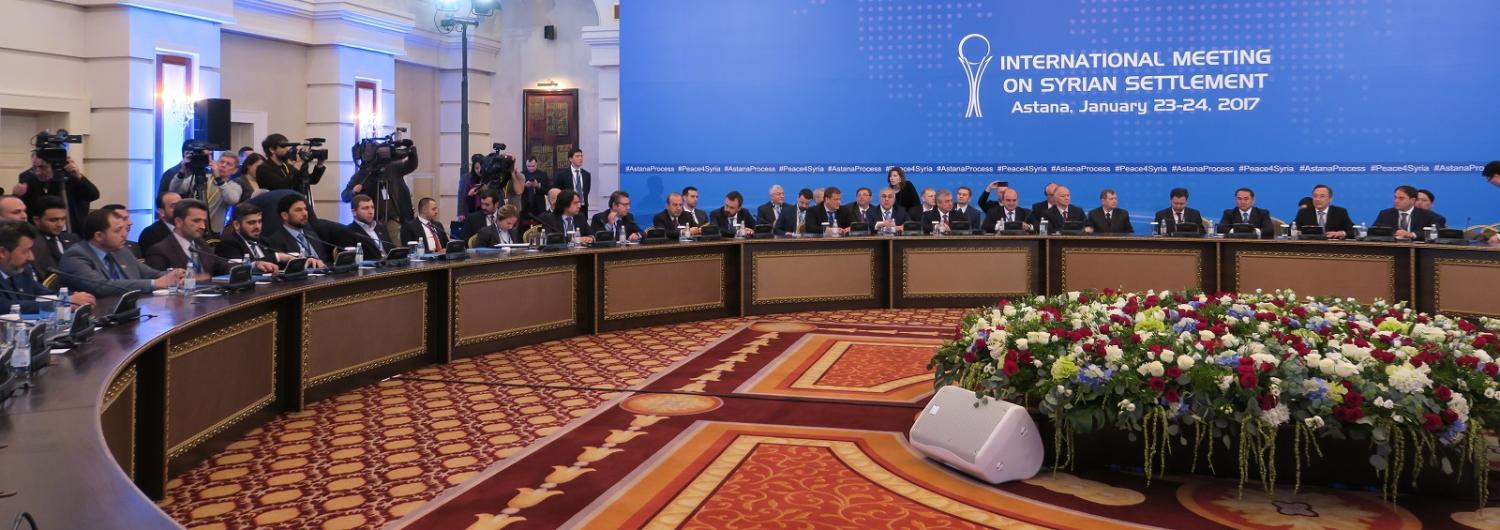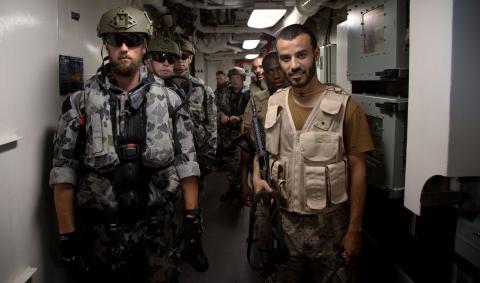Day one of joint Russian-Turkish sponsored Syrian peace talks concluded early this morning Australian time in the Kazakhstan capital of Astana with limited progress.
Expectations for the talks are modest: the strengthening of a shaky ceasefire that came into place late last month late last month and the freeing of some political prisoners. There is cautious optimism that some concessions will be made.
This is the first time rebels from opposition fighting factions in Syria have come face-to-face with representatives from the Syrian regime. The two sides are not expected to engage directly, but will be in the same room. The Syrian government has consistently described the armed groups as terrorists, and refused to meet with them in previous UN and US-sponsored talks, while Russia has echoed calls to add those attending in Astana to international terror lists.
Rather than leaders from the fractious exiled political opposition (who have little sway over the fighters on the ground), the opposition delegation is made up of fighting factions, and headed by the militant leader of the powerful Jaish al-Islam group, Mohammad Alloush. The Syrian government delegation also included Syrian army officers, according to media reports.
More significantly however, the talks are being moderated by Syrian government ally Russia, in the capital city of a former Soviet republic, without US involvement, at a time when the military conditions on the ground put the ball firmly in Russia’s court. The Syrian army's conquest in the contested city of Aleppo with heavy backing from Russian air power late last year has forced the rebels to concede that they will have to deal with Russia if any progress is to be made. A US delegate was allocated mere observer status in the talks.
Newly installed US President Donald Trump has made no secret of his desire for closer relations with the former Cold War rival, and, in an astonishing statement made as the talks got underway, US Press Secretary Sean Spicer announced the US would be willing to work with 'work with any country that shares our interest in defeating ISIS', including 'Russia or anyone else'. Spicer denied, however, a Russian Ministry of Defense statement that the two countries had coordinated on their first joint combat mission against the extremist group.
In previous US-led talks, Russia frustrated progress on the basis that the US has supported rebel insistence that Syrian President Bashar Assad must step down. Assad’s position in any future settlement is not on the table at Astana, and Turkey, a staunch rebel ally, has quietly dropped its long-held position that he must step down. The fight against Islamic State is also not up for discussion, for now.
In a sign that it is willing to pressure Syria, Russia issued a starkly worded statement accusing the Syrian government of breaking the fragile ceasefire.
But hopes of rapprochement between bitterly opposed sides must be tempered by the significant absentees from the talks. Concerns about the extent of Russian influence over powerful Syrian ally Iran, whose Shiite militias and proxy force (the Lebanese Shiite movement, Hezbollah) have been instrumental in the Syrian army conquests of contested territory, are also proving thorny.
Most notably, the powerful Jabhat Fateh Al-Sham (formerly known as al-Qaeda in Syria or the Nusra Front), which holds significant territory and enjoys relatively widespread support in the rebel-held north and southern Syrian province of Deraa, was not in attendance. Nor was the powerful faction Ahrar al-Sham which Russia wants added to the US terrorist list. Also not invited was the Kurdish PYD. The PYD holds a swathe of territory along the Turkish border and is considered the most effective ground force fighting IS, but is also engaged in a long-standing dispute with Turkey, which has prioritised the prevention of a Kurdish statelet on its southern border over the fight against IS. Saudi Arabia, arguably the biggest sponsor of the largest rebel groups (at least at a non-state level) was also not invited.
These are significant gaps and it remains to be seen how any agreement by the lesser factions (which are also engaged in their own inter-rebel disputes with the fighting forces not represented in Astana) could be applied to those with sway on the ground.
And then there is Iran. The Free Syrian Army tweeted a demand ahead of the talks that highly ideological and religiously motivated Iranian-sponsored militias, accused of reprisal attacks against Sunni civilians in Syria and Iraq, be also be added to the internationally designated terror list. It also demands the release of political prisoners in Syrian jails and the full implementation of the ceasefire countrywide.
Rebel supporters point to the weeks-long siege and sectarian reprisals at the hands of Iranian militias in the town of Wadi Barada, close to the Lebanese border, as evidence that Russia is unable to control Iran in Syria.
These talks, which have one day left to run and can be viewed as a precursor to UN-mediated peace talks in Geneva on 8 February, are the clearest indication yet that Russia is seeking an exit from the Syrian conflict and may be willing to pressure its Syrian ally. They have also demonstrated, however, that there are limits to Russian diplomacy, especially when all of the warring factions do not have a seat at the table and those whose interests are served by prolonging the war fail to engage.

